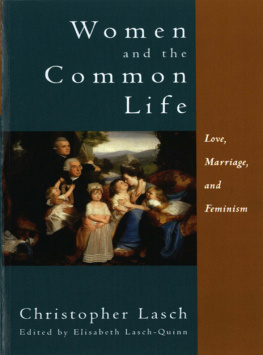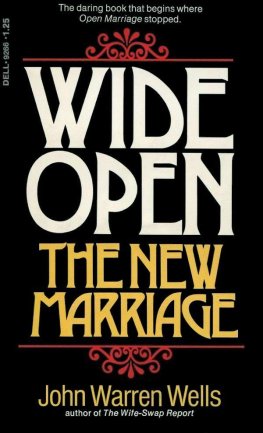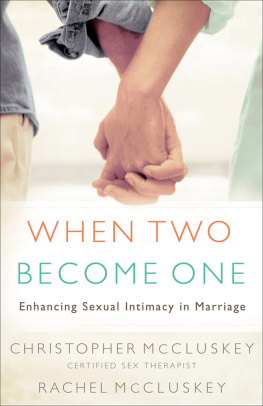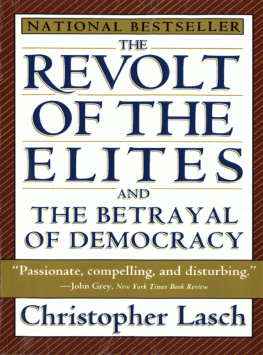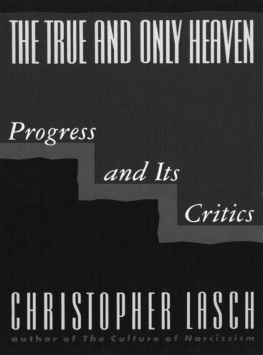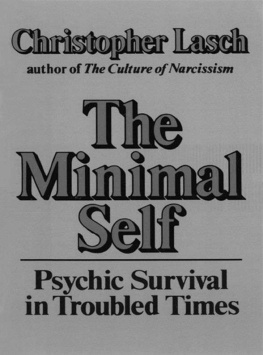OTHER BOOKS BY CHRISTOPHER LASCH
The American Liberals and the Russian Revolution (1962)
The New Radicalism in America (1965)
The Agony of the American Left (1969)
The World of Nations (1973)
Haven in a Heartless World (1977)
The Culture of Narcissism (1979)
The Minimal Self (1984)
The True and Only Heaven (1991)
The Revolt of the Elites and the Betrayal of Democracy (1995)


Contents

T he publication of this book would have been impossible without those who encouraged and assisted my father as he persevered on this project at the end of his life and who encouraged and assisted me after his death. Jean Bethke Elshtains enthusiasm was vital in advancing the work. Nell Commager Lasch and Ray Lasch-Quinn helped immeasurably; their practical assistance and moral support for the particularly complex demands of this project sustained it at every stage. In the works latter stages Rochelle Gurstein, Richard Wightman Fox, William Leach, and Robert Westbrook also read a draft of the introduction and their suggestions and heartening responses further inspired the project. Amy Cherry, the books editor at Norton, contributed valuable assistance.
Though my father did not let me know his wishes for a dedication, this collection makes it clear just how much he treasured the quality of the life created by his kindred spirits: friends, students, readers, fellow writers and teachers, family members, and others. Their lively spirit and capacity for commitments of all kinds prove that the common life can, when nourished so well, not just exist but thrive.
We put our love where we have put our labor.
RALPH WALDO EMERSON Journals, 1836

I n 1985 Christopher Lasch, my father, mentioned to me that he was reading Rousseau and Poullain de la Barre. When I asked him why, he wrote in a letter:
Sometimes I ask myself the same question. Im trying to trace the interconnections between the modern ideology of intimacy, the new domestic ideal of the nineteenth century, and feminismsomething like that. Its called, tentatively, The Domestication of Eros. Ive been working on it for a long timeabout twenty-five yearsbut the focus keeps changing. Sometimes I wonder how I got myself into this tangle [March 12, 1985].
This collection of essays does not pretend to hold the resolution of Christopher Laschs thinking on this imposing theme. In fact, in one of the most recent essays assembled here he refers to his many years of inconclusive struggle with the subject. Women and the Common Life, however, offers some of his most absorbing forays into terrain that is both intriguing and confounding in its complexity. Taken together, these essays suggest a number of reasons why Christopher Lasch, historian and social critic, might have gotten himself into this tangle.
Writing about women well before the field of womens history came into its own in the 1970s and 1980s,history of the West more generally that give these essays their coherence and significance.
In 1993 and 1994, while battling cancer, Christopher Lasch was at work on this collection of essays, deciding which previously published essays to include and revising Bourgeois Domesticity , the only essay that has not been published elsewhere. At the same time he was finishing the work on his last book, The Revolt of the Elites and the Betrayal of Democracy (1995). Remarkably, he worked up to the very end of his lifethrough nausea, fatigue, and paincompleting The Revolt of the Elites ten days before he died on Valentines Day 1994.
I was fortunate to be able to spend much time with my father in the last months of his life, becoming increasingly involved in the final stages of The Revolt of the Elites and this collection. The essays published here include only the pieces my father told me definitively that he wanted included; I followed his wishes exactly, at the risk of leaving out other essays of his that could easily and naturally have fit. The essays he decided to incorporate, I believe, complement one another beautifully, despite their coverage of a great range of subjects over a large span of time. I hope, as he would have, that interested readers will seek out the numerous other essays and articles he produced on related subjects, as well as his books, which elaborate his interpretations further, especially his full-length study of the family, Haven in a Heartless World: The Family Besieged (1977).
My aim has been to remain as true to my fathers vision of this collection as possible. The previously published essays have been only lightly edited, mainly for typographical errors. Bourgeois Domesticity, still unfinished at my fathers death, required a title and a conclusion,title of the collection, which we referred to simply as the women essays when it was in progress, suggested itself to me directly from the essays; I hoped it would capture the central themes without imposing an interpretation that was foreign to the work. Indeed, this brief introduction aims merely to point to some of the connective tissue that the essays themselves intrinsically possess.
T he coherence of these essays is best expressed in that precise phrase from my fathers letter to me ten years ago. While ranging from a discussion of the querelle des femmes of the Middle Ages to the postmodern family of the late twentieth century, the essays, as assembled, do make important interconnections between the modern ideology of intimacy, the new domestic ideal of the nineteenth century, and feminism. While there are sometimes frustrating contradictions in the essaysexplained by developments in his thinking, in some cases, and unresolved questions, in othersseveral themes emerge: changing marital ideas and practices; feminisms link to the history of the middle class and the family; a counter-tradition of love; the history of self-respect; and the rationalization of everyday life. In many ways it is this rationalization of life that provides an overarching explanation for the changes in conceptions of love, marriage, and feminism analyzed in these short works.
Much of modern life, in Laschs portrait, rests on the assumption that all realms of activity should come under intense scrutiny, that science and rationality can best lead to an understanding of human experience, and that only trained experts can direct the conduct of daily existence. The reordering of life according to such principles of rationalization resulted from the tendency of corporate capitalism and the modern liberal state to expand their power, which they accomplished by means of a bureaucratic structure and paternalistic ethos. The service professions, acting on behalf of the state, intruded into the private domain, helping to replace habit and custom with esoteric techniques for addressing everyday problems, causing a situation of dependence on elites that is antithetical to democracy.
The subjection of all of life to scrutiny, surveillance, and ultimately manipulation by outside experts led to a degradation of the common life, a rich dimension of human experience and, to Lasch, both a prerequisite for and a goal of democratic citizenship. Characterized by competition and cooperation with others toward a shared end, the common life (often an extension of family life) springs from voluntary gatherings in which the lines of work, play, community organizing, socializing, and other purposes tend to cross. Fostering spontaneity, invention, and self-reliance, this arena transcends purely intimate contacts but steers clear of any source of external power, turning instead to its own set of rules and standards of fairness, excellence, and common sense, forged from experience and tradition. The common life not only nurtures the individual responsibility and courage demanded for democracy but provides the kind of life that is worth living in the first place.

